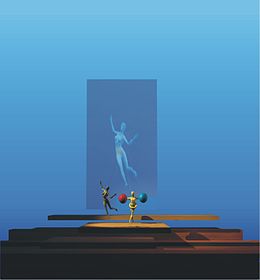Les mamelles de Tirésias
| Les mamelles de Tirésias | |
|---|---|
| Opera by Francis Poulenc | |

Design for the opera, 2001
|
|
| Description | opéra bouffe |
| Translation | The Breasts of Tiresias |
| Librettist | Poulenc |
| Language | French |
| Based on |
The Breasts of Tiresias by Guillaume Apollinaire |
| Premiere | 3 June 1947 Opéra-Comique, Paris |
Les mamelles de Tirésias (The Breasts of Tiresias) is an opéra bouffe by Francis Poulenc, in a prologue and two acts based on the play of the same title by Guillaume Apollinaire. The opera was written in 1945 and first performed in 1947.
Although the action of the opera is farcical, it contains a serious message: the need to rediscover and repopulate a country ravaged by war.
Guillaume Apollinaire was one a group of poets whom Poulenc had met as a teenager. Adrienne Monnier's bookshop, the Maison des Amis des Livres, was a meeting place for avant-garde writers including Apollinaire, Max Jacob, Paul Éluard and Louis Aragon. Apollinaire, the illegitimate son of a Polish noblewoman, was described by the critic Edward Lockspeiser as the prominent leader of Bohemian life in Montparnasse. Among his achievements were to bring to prominence the painter the Douanier Rousseau, and to invent the term "surrealism", of which he was a leading exponent. In June 1917 the audience for the first performance of Apollinaire's "drame surréaliste", Les Mamelles de Tirésias, at a theatre in Montmartre included Jean Cocteau, Serge Diaghilev, Léonide Massine, Henri Matisse, Pablo Picasso, Erik Satie, and the young Poulenc. Many years later Poulenc said that though he had been immensely amused by the farcical piece it did not occur to him at the time that he would ever set it to music.
Poulenc first set Apollinaire's words to music in his 1919 song cycle La Bestiaire, and returned to the poet's work for the choral work Sept chansons (1936). During the 1930s he first thought of setting Les mamelles de Tirésias as an opera; in 1935 he adapted the script as a libretto, with the blessing of Apollinaire's widow, and began sketching the music in 1939, with most of the composition done in a burst of creativity between May and October 1944. Although the play was written in 1903, by the time of its premiere France was in the thick of the First World War, and Apollinaire had revised the piece, adding a sombre prologue. Poulenc aimed to reflect both the farcical and the serious aspects of the play. The critic Jeremy Sams describes the opera as "high-spirited topsy-turveydom" concealing "a deeper and sadder theme – the need to repopulate and rediscover a France ravaged by war."
...
Wikipedia
